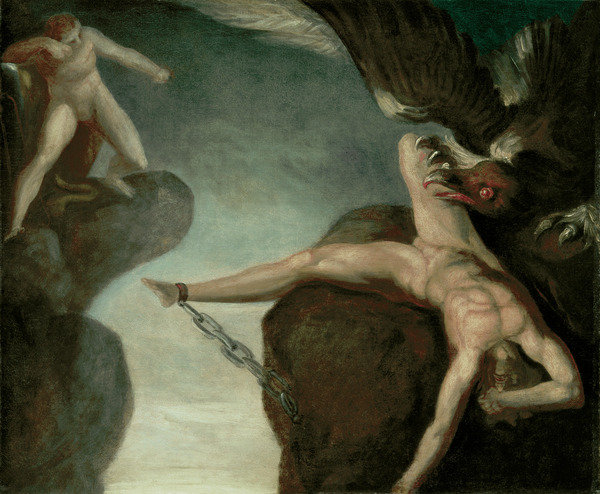The Torches of Prometheus
dal 19/6/2014 al 11/10/2014
Segnalato da
19/6/2014
The Torches of Prometheus
Kunsthaus Zurich, Zurich
Henry Fuseli and Javier Tellez. The exhibition presents two artistic positions that exemplify how the Prometheus myth has been adapted and reinterpreted between 1770 and the present day.

From 20 June to 12 October 2014 the Kunsthaus Zürich presents two artistic
positions that exemplify how the Prometheus myth has been adapted and
reinterpreted between 1770 and the present day. The exhibition ‘The Torches
of Prometheus. Henry Fuseli and Javier Téllez’ combines about 20 works of
the early modern era with a contemporary film installation.
For Henry Fuseli (1741-1825) the bound figure of Prometheus, whose
iconography dates back to Ancient Greece, was the quintessential embodiment
of the modern artist. Fuseli’s subjective and highly expressive handling of the
figure began with an anatomical game: the ‘five-point drawings’ in which the
positions of the head, hands and feet were dictated by five dots randomly placed
on a sheet of paper. His sketches and paintings were an appeal to the limitless
creativity of the modern human being, but did not shy away from the dangers
inherent in the urge for emancipation. In myth, Prometheus is punished for
stealing fire. He is bound to a rock in the Caucasus where each day an eagle is
sent by Zeus to feed on his liver. Finally, after many generations, he is freed by
Heracles. As a further punishment the gods send Pandora to dwell on Earth and
bring misery to the human race.
PROMETHEUS’S FIRE UNLEASHED
Prometheus was venerated throughout the ancient world. He was admired for
the vigour of his opposition to brute force and established authority. This
message is as relevant today as it has ever been. Once lit, Prometheus’s fire is
almost impossible to control. It took Europe more than a century to harness the
heady dynamism of the Industrial Revolution and turn it to beneficial use. In
Ancient Greece, when the decision was taken to hold the Olympic Games every
four years in honour of Zeus, the fire was lit with a torch commemorating that
same Prometheus. To this day the Olympic flame, which is lit in Athens and then
sent on a journey throughout the world, recalls the emancipatory act of this hero
of Antiquity.
ARYAN IDEALS AND ‘DEGENERATE’ ART
In the 19th and 20th centuries, artists such as Gustave Moreau, Arnold Böcklin,
Max Klinger, Constantin Brancusi, Jacques Lipchitz, Oskar Kokoschka, Barnett
Newman and Tim Rollins were inspired by the light and dark sides of the
Prometheus legend. One of the most striking works of contemporary art to deal
with the topic was created in 2011: the large-scale film installation ‘Rotations
(Prometheus and Zwitter)’ by Javier Téllez (b. 1969), which serves as a ‘window’
on the exhibition that curator Mirjam Varadinis is creating for the Venezuelan
shooting star at the Kunsthaus at the end of October.
Now on display, ‘Rotations’ shows two sculptures revolving in opposite
directions: on one side is the massive ‘Prometheus’ created by National Socialist
artist Arno Breker (1900-1991) for the Propaganda Ministry in Berlin in 1937; on
the other is the fragile work of the ‘outsider’ artist Karl Genzel (real name Karl
Brendel, 1871-1925) entitled ‘Zwitter’ (‘Hermaphrodite’) from 1920. Genzel was
one of the artists discussed in detail by Prinzhorn in his celebrated ‘Bildnerei
der Geisteskranken’ (‘Artistry of the Mentally Ill’, 1922). In his cell at an
institution, Genzel veered between boundless productivity, outbursts of rage,
hallucinatory experiences and a yearning for liberation on the one hand, and
inaction and resignation on the other. Both ‘Prometheus’ and ‘Zwitter’ were
exhibited in 1937 in Munich, as part of what were arguably the two most
controversial exhibitions of the 20th century: Breker’s larger-than-life nude
proclaimed the Aryan ideals of Nazi ideology in the ‘Grosse Deutsche
Kunstausstellung’ – the ‘Great German Art Exhibition’ – while Karl Genzel’s
small wood sculpture with its oversized genitals was held up as an example of
the pathologization of the European avant-gardes in the ‘Degenerate Art’
exhibition.
This exhibition concentrates in a small space all the contradictions inherent in
the historical reception of this ancient creation myth, its threatening dynamism
and the hopes it awakens.
CONCERT AND GUIDED TOURS
Public guided tours in German take place on Saturday 5 July at 11 a.m. and
Thursday 4 September at 6 p.m.
‘Stamped with Originality’, a concert to mark the 300th anniversary of the birth
of Carl Philipp Emanuel Bach, will be performed at 3 p.m. on Sunday 22 June.
The internationally renowned harpsichord player Preethi de Silva performs
some of the best-known pieces from C.P.E. Bach’s ‘Piano Sonatas, Free
Fantasias and Rondos’ on the fortepiano. De Silva will also talk about the links
between the music of C.P.E. Bach and Beethoven’s Prometheus compositions.
There will also be a reading of Goethe’s poem ‘Prometheus’ by the actor
Christian Dieterle (Berlin). Admission is included in the price of the exhibition
ticket.
The exhibition is accompanied by a publication in German and English with
contributions from Bernhard von Waldkirch and Mirjam Varadinis. With 64 pages
and some 34 illustrations, it is published by Scheidegger & Spiess and is
available in the Kunsthaus shop, price CHF 16.
FESTSPIELE ZÜRICH
The exhibition, which is curated by Bernhard von Waldkirch and Mirjam
Varadinis, is the Kunsthaus’s contribution to the Festspiele Zürich 2014, which
are devoted to the mythological figure of Prometheus. The festival programme is
available as a brochure in the Kunsthaus and can be obtained online at:
www.festspiele-zuerich.ch
Supported by the Festspiele Zürich
Image: Henry Fuseli, Herakles erlegt den Adler des Prometheus, 1781-85. Kunsthaus Zürich, gift Gustav Zumsteg 1998
CONTACT FOR THE MEDIA
Contact: Kunsthaus Zürich, Press & Public Relations
Kristin Steiner, kristin.steiner@kunsthaus.ch, tel.: +41 (0)44 253 84 13
Kunsthaus Zürich
Heimplatz 1, CH-8001 Zurich
Fri–Sun, Tues 10 a.m.–6 p.m., Wed, Thurs 10 a.m.–8 p.m.
Admission incl. collection: CHF 15 / CHF 10 (concessions). Children and young people up to the age of 16 free of charge.
Admission free on Wednesdays.



